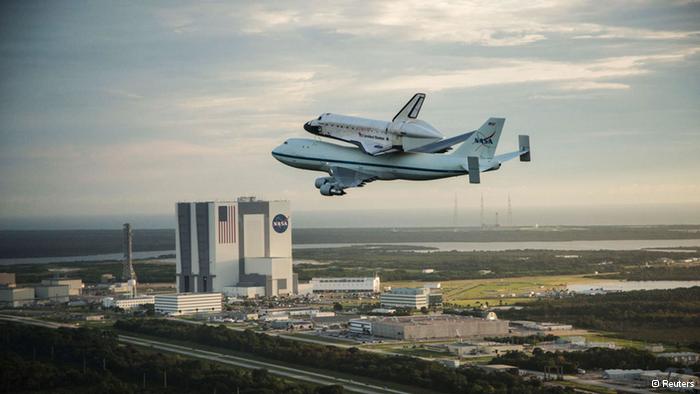
Los Angeles, September 22: The US space shuttle Endeavour took its final flight, making a spectacular series of flypasts over California before landing in Los Angeles, its retirement home near where it was built.
Riding piggyback on a specially fitted Boeing 747, the shuttle on Friday flew over San Francisco's Golden Gate bridge before heading south to take in the Hollywood sign and Disneyland, before landing at LA international airport (LAX).
"It's so cool, and so sad," said Todd Unger, 28, among thousands who camped out from the early hours at the Griffith Park Observatory, overlooking the city and the nearby iconic hilltop Tinsel Town sign.
"It's the end of an era. But it shows what America can do, we can be really proud," he added, waving a Stars and Stripes flag as the shuttle banked over the Hollywood Hills.
Cars were parked bumper-to-bumper up the winding roads leading up to the Observatory, as Angelenos turned out en masse in several parts of the city to witness Endeavour's final flight.
The shuttle had spent the night at Edwards Air Force base north of Los Angeles, the last leg after a two-day trip across the country from the Kennedy Space Center in Florida.
Before reaching the West Coast, it flew over Tucson, Arizona to honor former lawmaker Gabrielle Giffords, who survived a horrific shooting last year and whose astronaut husband Mark Kelly commanded Endeavour's final mission.
"It was pretty spectacular ... The people of Tucson got an incredible view of this remarkable machine," Kelly told CNN, adding: "It's really a testament to American ingenuity."
The shuttle will spend a few weeks at a United Airlines hangar at LAX, before being transferred to the California Space Center, where it will go on display on October 30.
Endeavour, which flew more than 185 million kilometers in its two-decade career, completed its final mission last year.
After the space agency NASA brought an end to the 30-year shuttle program last year, major US cities battled for the right to house one of the craft.
Enterprise, the prototype that never flew into space, is now on permanent display on the runway of the Intrepid aircraft carrier in New York.
The Kennedy Space Center will keep Atlantis, and Discovery is on display at a museum outside Washington.
Two other shuttles were destroyed in flight. Challenger disintegrated shortly after liftoff in 1986 and Columbia broke apart on re-entry to Earth in 2003. Both disasters killed everyone on board.
Endeavour's trip to Los Angeles is a homecoming of sorts. It was built in Palmdale, north of Los Angeles, as a replacement for Challenger.





Comments
Add new comment